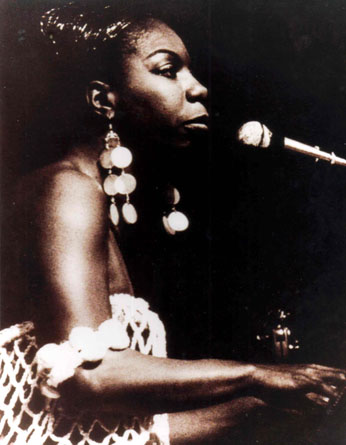HEWITT.MOBI
Friday, March 10, 2006
Nina Simone (Google Images)
Nina Simone - Documentary
Host: Vertamae Grosvenor (NPR)
Description:
Length 59:00 Mins
Size 55MB
Licensor Joyride Media
Producer(s) Paul Chuffo, Joyride Media
Formats Commentary, Documentary, Interview
Topics African American, Historical, Music
Produced January 1, 2006
Added to PRX 04 January 2006
This one-hour documentary pays tribute to legendary artist Nina Simone. Her black classical music broke down many boundaries and her voice spoke volumes. This program features many of Nina Simone's classic songs, as well as an interview recorded shortly before her death in 2003. Other interview subjects include Odetta, Patti Labelle, Ossie Davis, Camille Yarbrough, and journalist David Nathan.
55MB 128Kbps MP3
To download the Mp3 files so you can keep them on your computer for later listening:
PC: ' Click' on the link and select 'Save As. . .'
MAC: ALT-Click to launch the Download Manager
To download the Mp3 files so you can keep them on your computer for later listening:
PC: ' Click' on the link and select 'Save As. . .'
MAC: ALT-Click to launch the Download Manager
Nina Simone
From Wikipedia, the free encyclopedia
Eunice Kathleen Waymon, better known as Dr. Nina Simone (February 21, 1933 – April 21, 2003), was a singer, songwriter and pianist. She generally is classified as a jazz musician, although she disliked that categorisation herself; and her work also has been described as covering the blues, rhythm and blues and soul. Her vocal style is characterized by passion, breathiness, and tremolo.
Contents
* 1 Biography
o 1.1 Youth
o 1.2 First success
o 1.3 Civil rights
o 1.4 Greatest hits
o 1.5 Later life
* 2 Quotation
* 3 Bibliography
Biography
Youth
Simone was born Eunice Kathleen Waymon at 30 East Livingston Street in Tryon, North Carolina, one of eight children. Like a number of other African-American singers, she was inspired as a child by Marian Anderson and began singing at her local church, also showing prodigious talent as a pianist. When she debuted publicly at a piano recital at age ten, her parents, who had taken seats in the front row, were forced to move to the back of the hall to make way for whites. This incident contributed to her later involvement in the civil rights movement.
At seventeen, Simone moved to Philadelphia, Pennsylvania, where she taught piano and accompanied singers. She was able to begin studying piano at New York City's prestigious Juilliard School of Music, thanks to the sponsorship of benefactors, but lack of funds meant that she was unable to fulfill her dream of becoming America's first African-American concert pianist. She later had an interview to study piano at the Curtis Institute, but was rejected. Simone believed it was because she was black.
First success
Simone turned instead to blues and jazz after getting her start in an Atlantic City nightclub, taking the name Nina Simone in 1954 - "Nina" was her boyfriend's nickname for her (from the [Spanish language for "little girl"), and "Simone" was after the French actress named Simone Signoret. She first came to public notice in 1959 with her wrenching rendition of George Gershwin's "I Loves You Porgy" (from Porgy and Bess), her only Top 40 hit in the United States. This was soon followed by the single "My Baby Just Cares for Me" (this was also a hit in the 1980s in the United Kingdom when used for television advertisements for Chanel No. 5 perfume).
Civil rights
Throughout the 1960s, Simone was involved in the civil rights movement and recorded a number of political songs, including "To Be Young, Gifted and Black" (later covered by Aretha Franklin and Donny Hathaway), "Backlash Blues," "Mississippi Goddam" (a response to the murder of Medgar Evers and the bombing of a church in Birmingham, Alabama killing four black children), "I Wish I Knew How It Would Feel to Be Free," and Kurt Weill's "Pirate Jenny," set in a southern hotel.
Greatest hits
In 1961, Simone recorded a version of the traditional song "House of the Rising Sun", a song which was later recorded by Bob Dylan and was a hit for The Animals. Other songs she is famous for include "I Put a Spell on You" (originally by Screamin' Jay Hawkins), The Beatles' "Here Comes the Sun," "Four Women," "I Shall Be Released," and "Aint Got No (I Got Life)." In 1987, Nina experienced a resurgance in popularity when "My Baby Just Cares for Me," a track from her first Bethlehem Records album (originally released in 1958) became a huge hit in the U.K. and elsewhere. Nina's versatility as an artist was evident throughout her music, which often had a folk-music simplicity. In a single concert, she moved easily from gospel-inspired tunes to blues and jazz and, in numbers like "For All We Know," to numbers infused with European classical stylings, and counterpoint fugues. Simone's "Sinnerman" featured in The Thomas Crown Affair, with Pierce Brosnan and Rene Russo and in Cellular with Kim Basinger and Chris Evans.
Later life
In 1971, Simone left the United States following disagreements with agents, record labels, and the tax authorities, citing racism as the reason. She returned in 1978 and was arrested for tax evasion (she had withheld several years of income tax as a protest against the Vietnam War). She lived in various countries in the Caribbean, Africa, and Europe, continuing to perform into her 60s. In the 1980s, she performed regularly at Ronnie Scott's jazz club in London.
In 1995, Simone purportedly shot and wounded her neighbour's son with a pneumatic pistol after his laughing disturbed her concentration. She also fired at a record company executive whom she accused of stealing royalties (see[1]).
She had a reputation in the music industry for being volatile and sometimes difficult to deal with, a characterization with which Simone strenuously took issue. Though her onstage style could be somewhat haughty and aloof, in later years Simone particularly seemed to enjoy engaging her adoring audiences by recounting sometimes humorous anecdotes related to her career and music and soliciting requests. Simone's regal bearing and commanding stage presence earned her the title the "High Priestess of Soul."
Her daughter, an actress/singer known only as Simone, has appeared on Broadway in Aida. Simone's autobiography I Put a Spell on You (ISBN 0306805251) was published in 1992. In 1993, she settled near Aix-en-Provence in the south of France. She had been ill with cancer for several years before she died in 2003, aged 70, in her sleep at her home in Carry-le-Rouet.
Her music continues to be featured in motion picture soundtracks, including the 1993 film Point of No Return (aka The Assassin), The Thomas Crown Affair, 2002's The Bourne Identity, and 2004's Cellular. Her music is also used in Shallow Grave and at the end of Before Sunset.
Quotation
* "Jazz is a white term to define Black people. My music is Black classical music."
Bibliography
* (with Stephen Cleary) I Put a Spell on You: The Autobiography of Nina Simone (New York: Pantheon, 1991). ISBN 0679410686
* Feldstein, Ruth. "'I Don't Trust You Anymore': Nina Simone, Culture, and Black Activism in the 1960s", Journal of American History, Vol. 91, No. 4, March 2005.
Charlie
hewitt.mobi Posted at 12:37 am |
0 comments
0 Comments:






